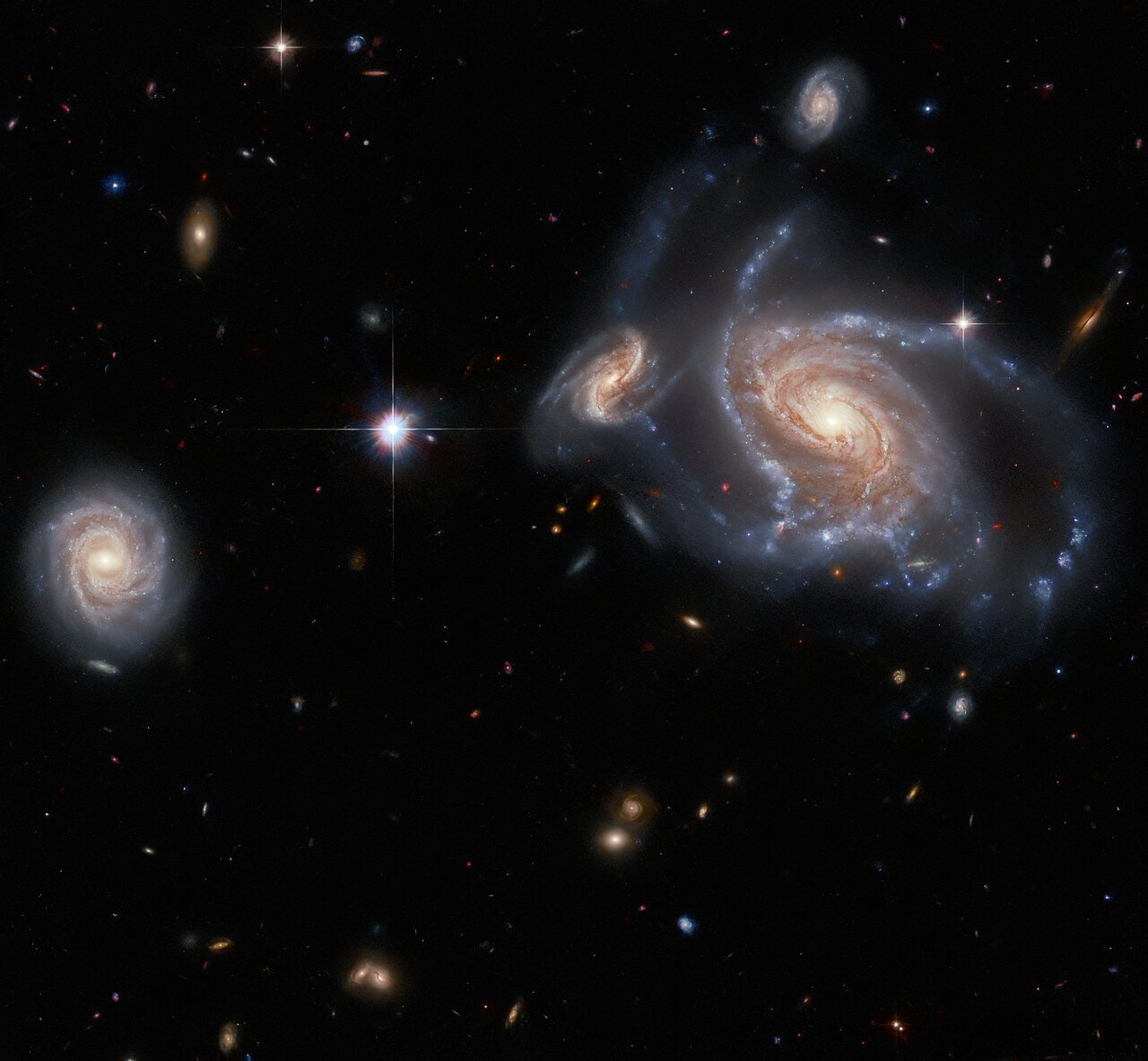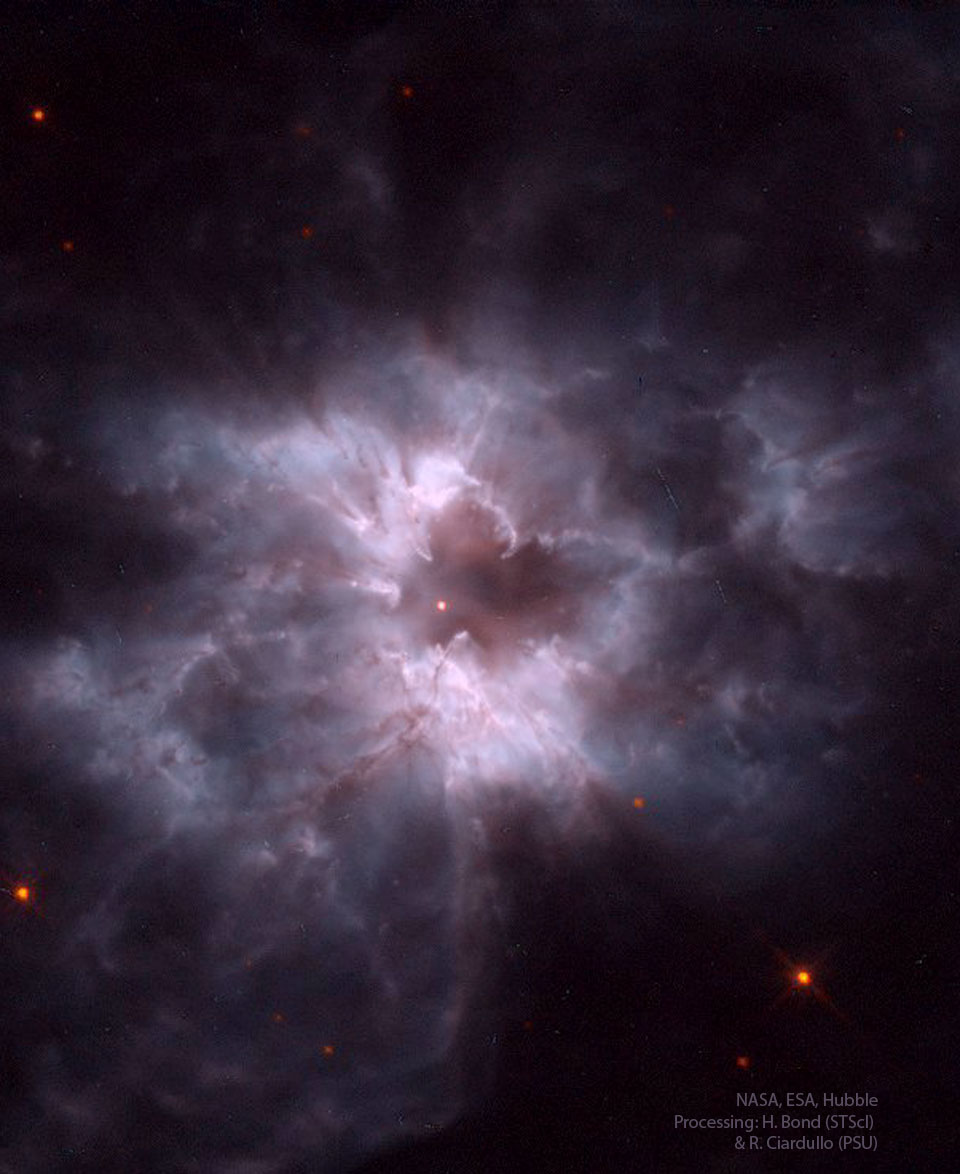This Hubble Picture of the Week features a richness of spiral galaxies: the large, prominent spiral galaxy on the right side of the image is NGC 1356; the two apparently smaller spiral galaxies flanking it are LEDA 467699 (above it) and LEDA 95415 (very close at its left) respectively; and finally, IC 1947 sits along the left side of the image.
ThIs image is a really interesting example of how challenging it can be to tell whether two galaxies are actually close together, or just seem to be from our perspective here on Earth. A quick glance at this image would likely lead you to think that NGC 1356, LEDA 467699 and LEDA 95415 were all close companions, whilst IC 1947 was more remote. However, we have to remember that two-dimensional images such as this one only give an indication of angular separation: that is, how objects are spread across the sphere of the night sky. What they cannot represent is the distance objects are from Earth.
For instance, whilst NGC 1356 and LEDA 95415 appear to be so close that they must surely be interacting, the former is about 550 million light-years from Earth and the latter is roughly 840 million light-years away, so there is nearly a whopping 300 million light-year separation between them. That also means that LEDA 95415 is likely nowhere near as much smaller than NGC 1356 as it appears to be.
On the other hand, whilst NGC 1356 and IC 1947 seem to be separated by a relative gulf in this image, IC 1947 is only about 500 million light-years from Earth. The angular distance apparent between them in this image only works out to less than four hundred thousand light-years, so they are actually much much closer neighbours in three-dimensional space than NGC 1356 and LEDA 95415!

Doug Hammond (born December 26, 1942) is an American free funk/avant-garde jazz drummer, composer, poet, producer, and professor. His first major release was Reflections in the Sea of Nurnen on Tribe Records in 1975.
He has worked with musicians including Earl Hooker, Sonny Rollins, Charles Mingus, Sammy Price, Donald Byrd, Wolfgang Dauner, Ornette Coleman, Steve Coleman, Nina Simone, Betty Carter, Marion Williams, Paquito D’Rivera, Arnett Cobb, James Blood Ulmer and Arthur Blythe.
see full post...John Scofield (born December 26, 1951) is an American guitarist and composer whose music over a long career has blended jazz, jazz fusion, funk, blues, soul and rock. He first came to mainstream attention in the band of Miles Davis, and has toured and recorded with many prominent jazz artists, including saxophonists Eddie Harris, Dave Liebman, Joe Henderson and Joe Lovano; keyboardists George Duke, Joey DeFrancesco, Herbie Hancock, Larry Goldings and Robert Glasper; fellow guitarists Pat Metheny, John Abercrombie, Pat Martino and Bill Frisell; bassists Marc Johnson and Jaco Pastorius; and drummers Billy Cobham and Dennis Chambers. Outside the world of jazz, he has collaborated with Phil Lesh, Mavis Staples, John Mayer, Medeski Martin & Wood, and Gov’t Mule.
Although he was born in Ohio, his family moved to Wilton, Connecticut, where he discovered his interest in music. Educated at the Berklee College of Music, Scofield left school to record with Chet Baker and Gerry Mulligan. He joined the Billy Cobham/George Duke Band soon after and spent two years playing, recording, and touring with them. He recorded with Charles Mingus in 1976 and replaced Pat Metheny in Gary Burton‘s quartet.
see full post...William Fredrick Bean (December 26, 1933 – February 6, 2012) was an American jazz guitarist from Philadelphia.
Bean was born into a musical family in Philadelphia. His mother played the piano. His father was an amateur singer and guitarist, and his sister was a professional singer. He started on guitar at the age of twelve.
His father taught him some of the basics on guitar before he received lessons from Howard Herbert.Then he studied for about one year with Dennis Sandole. During the late 1940s and 1950s, he performed at venues in the Philadelphia area. In the mid-1950s, he moved to New York City and recorded with Charlie Ventura and Red Callender, and in 1958 he moved to Los Angeles to record for Decca. In Los Angeles, he worked with Buddy Collette, Paul Horn, John Pisano, Bud Shank, Milt Bernhart, Les Elgart, Herb Geller, Lorraine Geller, Calvin Jackson, and Zoot Sims.
see full post...Please pray for peace in Israel and Palestine. So many people have died since Oct 7th 2023 it’s unbelievable and tragic. This cannot be ignored on this Christmas Day.

see full post...
NGC 2264 is the designation number of the New General Catalogue that identifies two astronomical objects as a single object: the Cone Nebula, and the Christmas Tree Cluster. Two other objects are within this designation but not officially included, the Snowflake Cluster, and the Fox Fur Nebula. All of the objects are located in the Monoceros constellation and are located about 720 parsecs or 2,300 light-yearsfrom Earth. Due to its relative proximity and large size, it is extremely well studied. NGC 2264 is sometimes referred to as the Christmas Tree Cluster and the Cone Nebula. However, the designation of NGC 2264 in the New General Catalogue refers to both objects and not the cluster alone. In December 2023, NASA released Christmas holiday-related images by the James Webb Space Telescope, including the Christmas Tree Galaxy Cluster and others.

Ann Lennox OBE (born 25 December 1954) is a Scottish singer-songwriter, political activist and philanthropist. After achieving moderate success in the late 1970s as part of the new wave band the Tourists, she and fellow musician Dave Stewart went on to achieve international success in the 1980s as Eurythmics. Appearing in the 1983 music video for “Sweet Dreams (Are Made of This)” with orange cropped hair and wearing a man’s business suit, the BBC states, “all eyes were on Annie Lennox, the singer whose powerful androgynous look defied the male gaze“. Subsequent hits with Eurythmics include “There Must Be an Angel (Playing with My Heart)“, “Love Is a Stranger” and “Here Comes the Rain Again“.
Lennox embarked on a solo career in 1992 with her debut album, Diva, which produced several hit singles including “Why” and “Walking on Broken Glass“. The same year, she performed “Love Song for a Vampire” for Bram Stoker’s Dracula. Her 1995 studio album, Medusa, includes cover versions of songs such as “No More ‘I Love You’s'” and “A Whiter Shade of Pale“. To date, she has released six solo studio albums and a compilation album, The Annie Lennox Collection (2009). With eight Brit Awards, which includes being named Best British Female Artist a record six times, Lennox has been named the “Brits Champion of Champions”. She has also collected four Grammy Awards and an MTV Video Music Award. In 2002, Lennox received a Billboard Century Award; the highest accolade from Billboard. In 2004, she received the Golden Globe and the Academy Award for Best Original Song for “Into the West“, written for the soundtrack to the feature film The Lord of the Rings: The Return of the King.
Lennox’s vocal range is contralto. She has been named “The Greatest White Soul Singer Alive” by VH1 and one of The 100 Greatest Singers of All Time by Rolling Stone. In 2012, she was rated No. 22 on VH1’s 100 Greatest Women in Music. In June 2013 the Official Charts Company called her “the most successful female British artist in UK music history”. As of June 2008, including her work with Eurythmics, Lennox had sold over 80 million records worldwide. As part of a one-hour symphony of British Music, Lennox performed “Little Bird” during the 2012 Summer Olympics closing ceremony in London. At the 2015 Ivor Novello Awards, Lennox was made a fellow of the British Academy of Songwriters, Composers and Authors (The Ivors Academy), the first woman to receive the honour. Lennox and her Eurythmics partner Dave Stewart were inducted into the Songwriters Hall of Fame in 2020, and the duo were inducted into the Rock and Roll Hall of Fame in 2022.
see full post...Don Gabriel Pullen (December 25, 1941 – April 22, 1995) was an American jazz pianist and organist. Pullen developed a strikingly individual style throughout his career. He composed pieces ranging from blues to bebop and modern jazz. The great variety of his body of work makes it difficult to pigeonhole his musical style.
Pullen was and raised in Roanoke, Virginia, United States. Growing up in a musical family, he learned the piano at an early age. A graduate of Lucy Addison High School, Pullen played in the school’s band. He played with the choir in his local church and was heavily influenced by his cousin, Clyde “Fats” Wright, who was a professional jazz pianist. He took some lessons in classical piano and knew little of jazz. At this time, he was mainly aware of church music and the blues.
Pullen left Roanoke for Johnson C. Smith University in North Carolina to study for a medical career, but soon he realized that his true vocation was music. After playing with local musicians and being exposed for the first time to albums of the major jazz musicians and composers, he abandoned his medical studies. He set out to make a career in music, desirous of playing like Ornette Coleman and Eric Dolphy.
see full post...Oscar Frederic Moore (December 25, 1916 – October 8, 1981) was an American jazz guitarist with the Nat King Cole Trio.
The son of a blacksmith, Moore was born in Austin, Texas, United States. The Moore family moved to Phoenix, Arizona, where he began performing with his older brother Johnny, who played both trombone and guitar. After moving to Los Angeles, he participated in his first recording session for Decca as part of the Jones Boys Sing Band led and arranged by Leon René. The group attracted local attention on radio and in two short films for MGM directed by Buster Keaton. Soon after, Moore accompanied pianist Nat King Cole at the Swanee Inn in North La Brea, Hollywood. He spent ten years with Cole in the piano-guitar-bass trio format, that influenced Art Tatum, Oscar Peterson, Ahmad Jamal.
Moore placed or topped polls in DownBeat, Metronome, and Esquire magazines from 1943 through 1948. Art Tatum professed his admiration for Moore in a 1944 magazine interview.
After he left the King Cole Trio in October 1947, he joined his brother in Johnny Moore’s Three Blazers as a member of that group into the early 1950s. Moore formed his own trio in 1952 and was active in Los Angeles. He recorded sessions as a leader and as a sideman throughout the 1950s, but left the industry at the end of the decade. He returned to the recording studio in 1965 to record a tribute to Cole and again in the 1970s, briefly backing Helen Humes. Moore died of a heart attack in Clark, Nevada, in 1981.
see full post...
Cabell Calloway III (December 25, 1907 – November 18, 1994) was an American jazz singer and bandleader. He was a regular performer at the Cotton Club in Harlem, where he became a popular vocalist of the swing era. His niche of mixing jazz and vaudeville won him acclaim during a career that spanned over 65 years.
Calloway was a master of energetic scat singing and led one of the most popular dance bands in the United States from the early 1930s to the late 1940s. His band included trumpeters Dizzy Gillespie, Jonah Jones, and Adolphus “Doc” Cheatham, saxophonists Ben Webster and Leon “Chu” Berry, guitarist Danny Barker, bassist Milt Hinton, and drummer Cozy Cole.
Calloway had several hit records in the 1930s and 1940s, becoming the first African-American musician to sell one million copies of a single record. He became known as the “Hi-de-ho” man of jazz for his most famous song, “Minnie the Moocher“, originally recorded in 1931. He reached the Billboard charts in five consecutive decades (1930s–1970s). Calloway also made several stage, film, and television appearances until his death in 1994 at the age of 86. He had roles in Stormy Weather (1943), Porgy and Bess (1953), The Cincinnati Kid (1965), and Hello Dolly! (1967). His career enjoyed a marked resurgence from his appearance in the 1980 film The Blues Brothers.
Calloway was the first African-American to have a nationally syndicated radio program. In 1993, Calloway received the National Medal of Arts from the United States Congress. He posthumously received the Grammy Lifetime Achievement Award in 2008. His song “Minnie the Moocher” was inducted into the Grammy Hall of Fame in 1999, and added to the Library of Congress‘ National Recording Registry in 2019. Three years later in 2022, the National Film Registry selected his home films for preservation as “culturally, historically or aesthetically significant films”.
see full post...A white dwarf star begins its life by casting off a cocoon of gas that enclosed its former self. In this analogy, however, the Sun would be a caterpillar and the ejected shell of gas would become the prettiest cocoon of all. In the featured cocoon, the planetary nebula designated NGC 2440 contains one of the hottest white dwarf stars known. The white dwarf can be seen as the bright orange dot near the image center. Our Sun will eventually become a white dwarf butterfly, but not for another 5 billion years.

David Louis Bartholomew (December 24, 1918 – June 23, 2019) was an American musician, bandleader, composer, arranger, and record producer. He was prominent in the music of New Orleans throughout the second half of the 20th century. Originally a trumpeter, he was active in many musical genres, including rhythm and blues, big band, swing music, rock and roll, New Orleans jazz, and Dixieland. In his induction into the Rock and Roll Hall of Fame, he was cited as a key figure in the transition from jump blues and swing to R&B and as “one of the Crescent City’s greatest musicians and a true pioneer in the rock and roll revolution”.
Many musicians have recorded Bartholomew’s songs, but his partnership with Fats Domino produced some of his greatest successes. In the mid-1950s they wrote more than forty hits for Imperial Records, including the Billboard number one pop chart hit “Ain’t That a Shame“. Bartholomew’s other hit songs as a composer include “I Hear You Knocking“, “Blue Monday“, “I’m Walkin’“, “My Ding-a-Ling“, and “One Night“. He was a member of the Songwriters Hall of Fame, the Rock and Roll Hall of Fame, and the Louisiana Music Hall of Fame.
see full post...Woody Herman Shaw Jr. (December 24, 1944 – May 10, 1989) was an American jazz trumpeter, flugelhornist, cornetist, composer, arranger, band leader, and educator. Shaw is widely known as one of the most important and influential jazz trumpeters and composers of the twentieth century. He is often credited with revolutionizing the technical and harmonic language of modern jazz trumpet playing, and to this day is regarded by many as one of the major innovators of the instrument. He was an acclaimed virtuoso, mentor, and spokesperson for jazz and worked and recorded alongside many of the leading musicians of his time. Woody Shaw was born in Laurinburg, North Carolina, United States. He was taken to Newark, New Jersey, by his parents, Rosalie Pegues and Woody Shaw Sr., when he was one year old. Shaw’s father was a member of the African American gospel group known as the “Diamond Jubilee Singers” and both his parents attended the same secondary private school as Dizzy Gillespie: Laurinburg Institute. Shaw’s mother was from the same town as Gillespie: Cheraw, South Carolina.
see full post...
